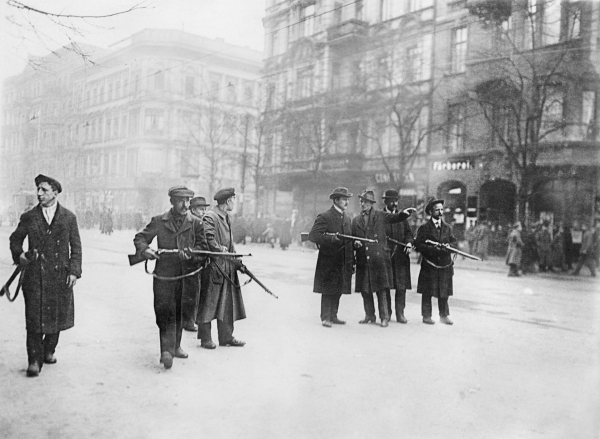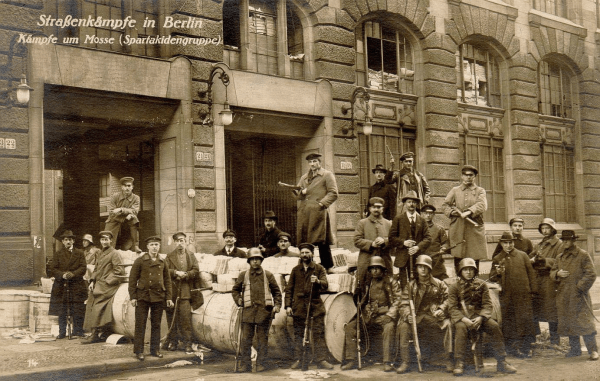Chaos and Violence in Berlin
My Father’s Involvement in the Freikorps
It is not certain in which year Ernst Klopp arrived in Berlin. He probably participated in the counter-revolutionary activities of the Freikorps deployments in the capital city. In January of 1919 street battles took place, as well as general strikes of all sorts, and at the beginning of March, a major attack of the Freikorps against the Berlin proletariate shook the nation. The Reich defence minister Notke issued the martial-law order, “Each person caught with weapons is to be shot immediately!” Ernst’s sister was indeed exercising a good portion of wisdom to tell her younger brother to throw away his gun.

BBC BiteSize provides the following historical background information: During 5 – 12 January 1919, 50,000 members of the post-World War One Communist Party, known as the Spartacists, rebelled in Berlin, led by Rosa Luxemburg and Karl Liebknecht. The government was saved when it armed bands of ex-soldiers, known as the Freikorps, who defeated the Spartacist rebels. In the aftermath, communist workers’ councils seized power all over Germany, and a Communist People’s Government took power in Bavaria. By May 1919 the Freikorps had crushed all of these uprisings.

At the mass demonstration against the treaty of Versailles in 1920, army and FreiKorps soldiers caused a bloodbath. In March of the same year, the FreiKorps supported the Kapp-Coup. One year later, the last armed Freikorps attacks took place during the communist general strikes in Central Germany. The extent of Ernst Klopp’s involvement in all of these events remains shrouded in darkness.
It is likely that a few years later Ernst Klopp received assistance from his old Freikorps connections, which through work communities (Arbeitsgemeinschaften) and work camps (Arbeitslager) provided shelter and employment to the old comrades up to the years 1924/1925 and in some cases even later on Pomeranian and Mecklenburg estates.
Wars don’t really end with an armistice or treaty, do they. After all the insane bloodshed of the war, then street-fighting and assassinations.
LikeLiked by 1 person
Sounds like the United States in 2020.
LikeLiked by 1 person
Yes, it sounds like it.
LikeLike
Very interesting. I knew that things were difficult in Germany after World War I, but never heard about these uprisings. I wonder whether any of the Spartacists ended up supporting Hitler because of his promises of a better economy. People who are desperate for economic relief might easily swing from left to right, searching for support.
LikeLiked by 1 person
The Spartacists were on the extreme left of the political spectrum and would not have supported Hitler. Their name is derived from the leader of the slaves who rebelled against their Roman masters, formed armies of the run-away slaves and even defeated initially entire Roman legions. His name was Spartacus.
LikeLike
Your father was a very brave man.
LikeLiked by 1 person
Whenever I find myself thinking that the times we’re living in now are hard, I have only to look at history and realize that we actually have it rather easy!
LikeLiked by 1 person
Yes, perhaps measured by wealth and physical possessions, we are living in a golden age in Europe and Northamerica.
LikeLiked by 1 person
Great story Peter! Thanks for sharing
LikeLiked by 1 person
What? Communists were there so early. Never knew that. Wow. Thanks for teaching me more about that time period ad history.
LikeLiked by 1 person
The Bolshevic revolution started in Russia in 1917 and communism spread all over Europe shortly afterwards.
LikeLike
Wow, I had no idea it touched Germany. They never taught us that.. no wonder there was friction that resulted in wars.
LikeLiked by 1 person
Sets one thinking. Though we know about history, we perhaps don’t see our ancestors as being ‘historical’ figures. Many of them lived in and through turbulent times. Making an effort to know more about their lives would be a great honour to their memory.
LikeLiked by 1 person